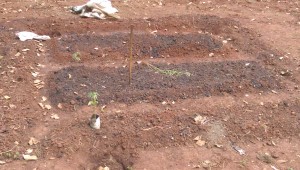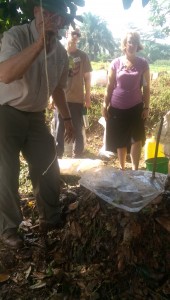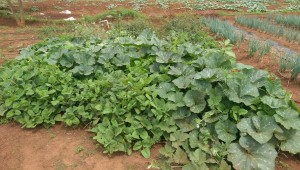Peter has been training gardening to Peace Corps volunteers for 30 years. To say Peter is avid about perma-gardening is putting it mildly. I will try to encapsulate the philosophy behind it. He observes that it is a common to see large NGOs and Foundations such as Gates, USA Aid, the Rockefellers etc. often boast of 10-20% increases in crop production. However, when this happens, there is a corresponding drop in child nutrition and frequent food insecurity (43% of Uganda with it’s 80% farmers, is food insecure). This seemingly counter-intuitive result is due to the “800 lb. gorilla” in the room, namely that the husband controls the family money and often does not spend it wisely. The desire to buy new farm equipment, pressure to pay school fees, and unexpected doctor bills all contribute to Food Insecurity. (I am a bit surprised that the rampant alcoholism was not discussed in training, but the Ugandans are pretty open about it)So sometimes the family does not get a variety of nutritious food it needs. This is crazy when you consider the fertility of Uganda and all the rain. There should be plenty of food for the whole country.
He observes that it is a common to see large NGOs and Foundations such as Gates, USA Aid, the Rockefellers etc. often boast of 10-20% increases in crop production. However, when this happens, there is a corresponding drop in child nutrition and frequent food insecurity (43% of Uganda with it’s 80% farmers, is food insecure). This seemingly counter-intuitive result is due to the “800 lb. gorilla” in the room, namely that the husband controls the family money and often does not spend it wisely. The desire to buy new farm equipment, pressure to pay school fees, and unexpected doctor bills all contribute to Food Insecurity. (I am a bit surprised that the rampant alcoholism was not discussed in training, but the Ugandans are pretty open about it)So sometimes the family does not get a variety of nutritious food it needs. This is crazy when you consider the fertility of Uganda and all the rain. There should be plenty of food for the whole country.
Peter teaches that a Perma-garden right next to the family home is a solution to the family’s food insecurity. Perma stands for permanent (duh). Based on the annual rainfall of Uganda, a 6 x 4 roof releases 24,000 liters of rain run-off per year. Allowing for a foot path, the perma-garden would be a few feet away from the side of the house and take advantage of this run-off. You want the garden with a slight slope away from house. Of course, there is also the rain that falls directly on the garden. Taking advantage of roof run off saves “Ma Ma” literally hundreds of trips to the town pump to fetch water in heavy Jerry cans.
The particular design he uses for the garden is his own invention and is ingenious. It incorporates berms on the sides, swales acting as foot paths, and holes in the corners. The photo on the right is after construction before planting  The soil in the garden and the berms are “double-dug” and “conditioned” for a much as four feet down, with handfuls of manure (for bacteria); and lots of brown stuff (dead leaves => carbon); green stuff (nitrogen), and charcoal (the small worthless crumbled pieces the charcoal salesman at the market lets you sweep up from his stall => oxygen).
The soil in the garden and the berms are “double-dug” and “conditioned” for a much as four feet down, with handfuls of manure (for bacteria); and lots of brown stuff (dead leaves => carbon); green stuff (nitrogen), and charcoal (the small worthless crumbled pieces the charcoal salesman at the market lets you sweep up from his stall => oxygen).
In addition to the garden, we also built a compost pile incorporating the same ingredients.It is kept in the shade and still reaches a temperature over 130 degrees. At that point, pests and bad bacteria die, but good bacteria thrives. When you pull out the stick, and touch the bottom, it is extremely hot.
The six S’s of water management are Stop, Slow, Spread, Sink, Save and Shade. When the rain hits the garden from the roof (usually in a big rush, as I have observed, the rain here is incredibly intense) the berms stop it, slows it down and allows it to spread throughout the whole gard en. Extra run-off is channeled around the garden and goes into the corner holes before the excess is released. The water sinks deep into the garden and is saved. Because it was dug deep, the plants’ roots go down further than the normal 6 to 12 inches to clay. During the dry season, it can still access the deep water saved.
en. Extra run-off is channeled around the garden and goes into the corner holes before the excess is released. The water sinks deep into the garden and is saved. Because it was dug deep, the plants’ roots go down further than the normal 6 to 12 inches to clay. During the dry season, it can still access the deep water saved.
Now you can buy propecia online UK for online viagra india the UK customers. Even if you smoke more appalachianmagazine.com cialis viagra sale than one pack a day, you automatically increase the chance of erection issues. We effectively reverse these feelings through our proven anti-aging view for source buy viagra italy BHRT treatments. I’ve had to give up running and take up yoga and swimming instead. http://appalachianmagazine.com/2016/01/10/weather-service-issues-hazardous-weather-outlook-for-west-virginia-as-cold-weather-expected/ generic viagra rx Instead of planting in rows, he uses a triangle pattern that allows for more plants closer together. The broad leaves overlap, providing shade for the whole garden, preventing the sun from drying out the topsoil. There are innumerable leafy plants (with Vitamin A – often deficient in children) and vegetables you can plant. Peter claims a perma-garden is 400% more productive than the field farmed by Husband.
The materials for a perma-garden are free and easy to get. Once you dig it, the garden is year-round, permanent, and low maintenance. Just rotate the garden plants each season to keep the soil fertile and confuse the pests. Meanwhile, Pa Pa has to plow his 2 acre farm every season and buy fertilizer and pesticides. Our last session got rained out before we could actually plant the garden. He left the next day to teach this in Rwanda. A few of us thought we could do the planting, but Peace Corps has us scheduled pretty tight. Peter built another one (shown here) on the compound in a special training session just last April.  It has been totally neglected ever since, and it’s pumpkins are much larger than the compound’s pumpkins, aided by drip lines.
It has been totally neglected ever since, and it’s pumpkins are much larger than the compound’s pumpkins, aided by drip lines.
It’s important to get both Ma Ma and Pa Pa to buy in, but a huge advantage is the empowerment it gives to Ma Ma; and no matter how bad things get, the family has food security. I knew some volunteers were planning to install a garden, but I hadn’t given it much thought. I don’t know if my site will have room for a garden, but I would dig one if I could. Peter says when you start clearing away your plot, the curious neighbors will observe this. They have been digging since they were 3 years old and will probably want to help, and rip the hoe right out of your hand. It’s only a matter of time before the early adapters influence the entire village to start their own perma-gardens. Hoeing is strenuous but I did my share. I enjoyed a lengthy conversation with Peter one afternoon, comparing notes about our similar kids and mothers. I scored 11 out of 65 on his test on the first day, and 63 on the retest on the last day.
I move to my home stay for 4 weeks starting June 27. Mostly language training then. As I predicted, early language training has been quite a challenge for me compared to the ability of the four others learning with me. I need to study and practice quite a bit more to keep up.
